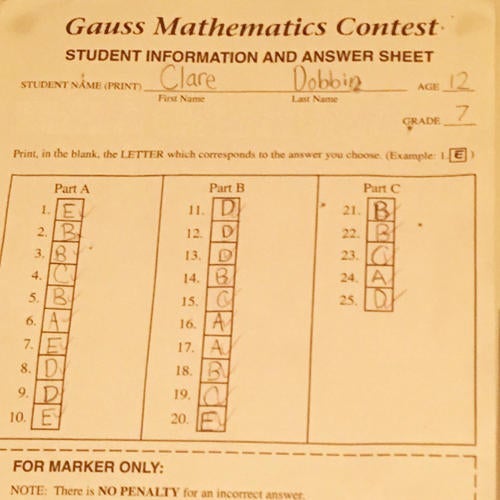
Written by Clare (she/her), student
Real talk: for a long time, I didn’t know what “CEMC” actually stood for. So, let me enlighten you.
In math terms, C = Centre, E = Education, M = Mathematics, and now redefine C = Computing. In English, the CEMC is short for “The Centre for Education in Mathematics and Computing.”
Now that we know what it stands for, we can talk about its purpose. The CEMC is actually a great resource to you as a high school student. In fact, the CEMC does so much that it received the 2018 Adrien Pouliot Award for “significant and sustained contributions to mathematics education in Canada.” Pretty impressive, huh? So, here’s how it can help you.
CEMC contests
Fundamentally, the CEMC promotes and creates materials in mathematics and computer science, and they’ve been doing it for years! Although it was officially founded in 1995, the CEMC started growing its roots in the '60s. Basically, what the CEMC wants is for you to enjoy mathematics.
First of all, if you’ve ever written a math contest in Canada, chances are the CEMC was part of it. They organize contests such as the Gauss, Pascal, Cayley, Fermat, Galois, Hypatia, and the list goes on. Taking math contests in high school is a great idea. Starting in Grade 6, I took every CEMC math contest offered at my school.
By Grade 10, I was really comfortable with the idea of a contest and was able to do well. Plus, they’re fun! There are interesting problems to solve, and by enrolling in contests, you get to know other students at your school who also like math.
An important contest that the CEMC offers is the Grade 12 Euclid contest.
Pro tip: if you’re applying to a Waterloo math program, the admissions team will look at your Euclid contest results! (You’ll also automatically be enrolled in a course called MTHEL 99 for first-year math readiness.)

Here’s a picture of a CEMC contest I took in Grade 7. Yes, I kept it. It’s significant in my life as I did better on it than I expected to, and it was the first time I thought I might be good at math. More importantly, it was one of the first times I was exposed to really interesting problems. Even though this contest is years old, I still remember the question I answered incorrectly and why I was wrong. It meant that much to me!
To be honest, this is the best I ever achieved on a math contest. And I was 12. Even though I never did as well in the years afterwards, I still participated in every contest possible. The CEMC really did ignite my passion for mathematics, and that’s why I encourage you to try taking a CEMC math contest, if you haven’t already.
It’s more than just contests
What else does the CEMC offer? Well, there are quite a few math enrichment opportunities available for students in high school. A great one is Math Circles, where high school students in Waterloo can attend lessons at the University to get ahead in their math classes and learn techniques for contests. Not located in Waterloo? No problem! You can find all the content covered in Math Circles online.
Additionally, the CEMC is passionate about gender equality in mathematics and computer science. Events like Think About Math! are designed to spark a passion for math and computer science in high school girls.
I actually had the privilege of volunteering at a Think About Math! event. At the event, high school students worked together to solve problems and they also got to hear a panel of successful women in STEM speak. It was a great event!
Finally, the CEMC will often visit students and teachers at Ontario high schools to hold workshops about math and computer science. At these visits, you’ll work with the CEMC to solve interesting problems and learn about the possibilities of a future in math.
Related articles

University math vs. high school math
There are quite a few differences between studying math in high school and university. Studying math in university allows for a much more in-depth understanding of mathematics than high school. You will have the opportunity to learn about math fields that you might not even know exist!

What's the best way to prepare for first-year math?
Are you gearing up for your first year of math? Discover the value of residence tutoring, the power of study groups, and why engaging with your professors can make all the difference. Ready to conquer your first year? Dive into this comprehensive guide to get prepared and stay ahead!

Future careers in mathematics
So you’re interested in math, finance, statistics, or computers? That’s great! The world needs more people like you.

